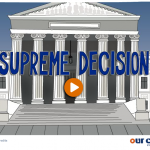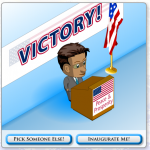Here’s a wonderfully serious piece in the magazine Foreign Policy on what the wizarding world should do to recover and reconcile now that Voldemort has finally been vanquished.
… if history teaches us anything (consider the bitter legacy still lingering from the 17th-century Goblin Wars or the recent experience of American Muggles in Iraq and Afghanistan), it is that the defeat of Voldemort by Harry Potter may have been the easy part. Indeed, one might even say it was child’s play. The hard work of postwar stabilization still lies ahead.
— Malinowski et al, 2011: Post-Conflict Potter in Foreign Policy.
It’s a bit long, but it’s worth reading at least through the first section on, “Transitional Justice and Reconciliation”.
This section points out that, sure, Voldemort’s henchmen need to be prosecuted before the law (and not just detained without charge), but it will be a lot more difficult to deal with the thousands who supported Voldemort in greater or lesser ways. After all, some of these only did what they did under threat. The article recommends a Truth and Reconciliation Commission like in South Africa.
Among their other recommendations are:
- the breaking the monopoly of the Daily Prophet on the news media,
- a Comprehensive Curse Ban Treaty,
- more transparency at the Ministry of Magic,
- a Charter on the Rights of Witches and Wizards,
- “that the Wizengamot, the high council of Magical Great Britain, be split into separate legislative and judicial bodies,”
- and closing Azkaban immediately.
You’ll notice that a number of these recommendations focus on expanding the rights of the individual and build in more checks and balances into government and the media. These, and the overall emphasis on building mechanisms to prevent future conflict, align well with the ideas of peace education. It might also be an interesting focus for a class discussion/Socratic dialogue.
I’d be curious to hear from any Harry Potter fans who might come across this post and have the time to read the article (even though school’s restarted and the homework’s being piled on).

